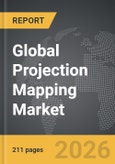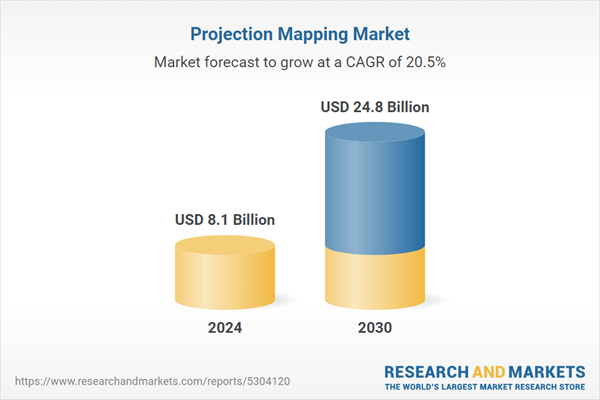Global Projection Mapping Market - Key Trends & Drivers Summarized
What is Projection Mapping, and How is it Transforming Visual Experiences?
Projection mapping, also known as spatial augmented reality, is a technology that uses projectors to display images, animations, and videos onto complex surfaces such as buildings, landscapes, and three-dimensional objects. Unlike traditional flat-screen projections, projection mapping allows designers to transform any surface into a dynamic display, creating immersive and interactive visual experiences that engage audiences in unique ways. Widely used in entertainment, advertising, events, and art installations, projection mapping enables content to seamlessly blend with physical environments, creating captivating displays that capture viewer attention. From projecting intricate visuals onto historic architecture to transforming objects in theater productions, projection mapping has become a powerful tool for storytelling and branding.This technology is increasingly popular as businesses seek innovative ways to captivate audiences and enhance experiences in real-world spaces. In entertainment, for example, projection mapping is used in concerts, festivals, and theatrical performances to create mesmerizing visual effects that enhance the atmosphere and engage viewers. In retail and advertising, brands use projection mapping to create memorable, interactive installations that leave a lasting impression on consumers. Projection mapping's versatility also extends to education and corporate training, where it is used to simulate environments and create engaging presentations. As demand grows for visually impactful experiences, projection mapping is transforming how we interact with physical spaces, bringing storytelling and brand messaging to life in vibrant and engaging ways.
How Are Technological Advancements Driving the Projection Mapping Market?
Technological advancements in high-resolution projectors, augmented reality (AR), and software algorithms have significantly expanded the potential of projection mapping, making it more precise, scalable, and accessible. Modern projectors, equipped with laser and LED technology, offer higher brightness, longer lifespans, and more vivid color output, allowing projections to remain clear and vibrant even on large surfaces or in challenging lighting conditions. These high-resolution projectors also support 3D projection mapping, enhancing the visual quality of projections and creating a more immersive experience for viewers. Additionally, advances in projection lenses and image processing ensure that visuals remain sharp and accurate, regardless of the surface geometry.Improved software and content creation tools have also elevated the projection mapping market by making it easier to design, manage, and deploy complex visuals. Specialized software platforms allow designers to map projections to the contours of any surface, aligning content with real-world objects seamlessly. Integration with augmented reality (AR) technologies has further advanced projection mapping, enabling interactive elements that respond to viewer movements or environmental changes. Real-time rendering and data integration have made projection mapping installations more adaptive, allowing for live visual effects, data-driven content, and audience interaction. With these advancements, projection mapping has become a dynamic, immersive medium for visual storytelling, fueling its growth across sectors looking to deliver high-impact experiences.
Why Are Businesses Increasingly Adopting Projection Mapping?
Businesses are adopting projection mapping as an innovative marketing and branding tool, recognizing its potential to create unique, memorable experiences that engage customers and boost brand visibility. In advertising, for example, companies use projection mapping on buildings or public spaces to create interactive campaigns that attract attention and differentiate their brands. This approach enables brands to tell stories in ways that traditional media cannot, leaving a lasting impression on audiences. In retail, stores and showrooms use projection mapping to enhance product displays, creating interactive visuals that highlight product features or simulate usage scenarios, ultimately driving customer engagement and interest.Projection mapping is also highly valuable in event and entertainment settings, where it enhances atmospheres and elevates audience experiences. For example, sports arenas, concerts, and exhibitions use projection mapping to create immersive environments that captivate spectators and add excitement to live events. In the tourism and hospitality industry, projection mapping is used in attractions, museums, and hotels to enhance guest experiences by transforming spaces with visually stunning displays. Beyond entertainment, educational and corporate sectors benefit from projection mapping by using it in presentations and training simulations, creating interactive learning environments. As businesses seek to provide meaningful and memorable experiences, projection mapping offers a powerful way to engage audiences, establish brand identity, and differentiate from competitors.
What Factors Drive Growth in the Projection Mapping Market?
The growth of the projection mapping market is driven by rising demand for immersive experiences, advancements in projector technology, and expanding applications across industries. As consumers increasingly seek engaging and interactive experiences, industries are leveraging projection mapping to transform environments and create novel visual interactions. The entertainment and events sectors have seen a surge in demand, as projection mapping offers a versatile solution for creating dynamic atmospheres that enhance audience engagement. The trend toward experiential marketing is also propelling growth in the retail and advertising sectors, as brands adopt projection mapping to create captivating, high-impact campaigns that resonate with audiences and foster brand loyalty.Technological improvements in projectors and content management software are additional drivers of market growth. The advent of high-brightness, energy-efficient projectors and sophisticated mapping software has made projection mapping more accessible, scalable, and cost-effective, encouraging adoption by both large enterprises and smaller businesses. Moreover, the availability of advanced 3D and AR capabilities enables more complex and interactive projections, expanding the use of projection mapping to new applications, such as immersive training environments and architectural visualizations. Lastly, the trend towards sustainability is contributing to growth, as projection mapping allows companies to create impactful displays without the waste associated with physical props or set designs. Together, these factors are driving the expansion of the projection mapping market, as businesses across sectors recognize its value in delivering unique, memorable experiences that resonate with modern audiences.
Report Scope
The report analyzes the Projection Mapping market, presented in terms of market value (US$ Thousand). The analysis covers the key segments and geographic regions outlined below.- Segments: Offering (Hardware, Software); Dimension (2D, 3D, 4D); Application (Media Events, Venue Openings, Entertainment, Product Launches, Retail, Other Applications).
- Geographic Regions/Countries:World; United States; Canada; Japan; China; Europe (France; Germany; Italy; United Kingdom; and Rest of Europe); Asia-Pacific; Rest of World.
Regional Analysis
Gain insights into the U.S. market, valued at $2.3 Billion in 2024, and China, forecasted to grow at an impressive 19.9% CAGR to reach $3.8 Billion by 2030. Discover growth trends in other key regions, including Japan, Canada, Germany, and the Asia-Pacific.Why You Should Buy This Report:
- Detailed Market Analysis: Access a thorough analysis of the Global Projection Mapping Market, covering all major geographic regions and market segments.
- Competitive Insights: Get an overview of the competitive landscape, including the market presence of major players across different geographies.
- Future Trends and Drivers: Understand the key trends and drivers shaping the future of the Global Projection Mapping Market.
- Actionable Insights: Benefit from actionable insights that can help you identify new revenue opportunities and make strategic business decisions.
Key Questions Answered:
- How is the Global Projection Mapping Market expected to evolve by 2030?
- What are the main drivers and restraints affecting the market?
- Which market segments will grow the most over the forecast period?
- How will market shares for different regions and segments change by 2030?
- Who are the leading players in the market, and what are their prospects?
Report Features:
- Comprehensive Market Data: Independent analysis of annual sales and market forecasts in US$ Million from 2024 to 2030.
- In-Depth Regional Analysis: Detailed insights into key markets, including the U.S., China, Japan, Canada, Europe, Asia-Pacific, Latin America, Middle East, and Africa.
- Company Profiles: Coverage of players such as AV Stumpfl GmbH, Barco, BenQ, Blue Pony, Christie Digital Systems USA, Inc. and more.
- Complimentary Updates: Receive free report updates for one year to keep you informed of the latest market developments.
Some of the 22 companies featured in this Projection Mapping market report include:
- AV Stumpfl GmbH
- Barco
- BenQ
- Blue Pony
- Christie Digital Systems USA, Inc.
- Digital Projection
- garageCube
- Green Hippo
- HeavyM
- Lumitrix s.r.o
- NEC Display Solutions
- NuFormer
- Optoma USA
- Panasonic Corporation
- Pixel Rain Digital
- Resolume
- Seiko Epson Corporation
- ViewSonic Corporation
- Vivitek
This edition integrates the latest global trade and economic shifts into comprehensive market analysis. Key updates include:
- Tariff and Trade Impact: Insights into global tariff negotiations across 180+ countries, with analysis of supply chain turbulence, sourcing disruptions, and geographic realignment. Special focus on 2025 as a pivotal year for trade tensions, including updated perspectives on the Trump-era tariffs.
- Adjusted Forecasts and Analytics: Revised global and regional market forecasts through 2030, incorporating tariff effects, economic uncertainty, and structural changes in globalization. Includes historical analysis from 2015 to 2023.
- Strategic Market Dynamics: Evaluation of revised market prospects, regional outlooks, and key economic indicators such as population and urbanization trends.
- Innovation & Technology Trends: Latest developments in product and process innovation, emerging technologies, and key industry drivers shaping the competitive landscape.
- Competitive Intelligence: Updated global market share estimates for 2025, competitive positioning of major players (Strong/Active/Niche/Trivial), and refined focus on leading global brands and core players.
- Expert Insight & Commentary: Strategic analysis from economists, trade experts, and domain specialists to contextualize market shifts and identify emerging opportunities.
Table of Contents
Companies Mentioned (Partial List)
A selection of companies mentioned in this report includes, but is not limited to:
- AV Stumpfl GmbH
- Barco
- BenQ
- Blue Pony
- Christie Digital Systems USA, Inc.
- Digital Projection
- garageCube
- Green Hippo
- HeavyM
- Lumitrix s.r.o
- NEC Display Solutions
- NuFormer
- Optoma USA
- Panasonic Corporation
- Pixel Rain Digital
- Resolume
- Seiko Epson Corporation
- ViewSonic Corporation
- Vivitek
Table Information
| Report Attribute | Details |
|---|---|
| No. of Pages | 211 |
| Published | January 2026 |
| Forecast Period | 2024 - 2030 |
| Estimated Market Value ( USD | $ 8.1 Billion |
| Forecasted Market Value ( USD | $ 24.8 Billion |
| Compound Annual Growth Rate | 20.5% |
| Regions Covered | Global |









